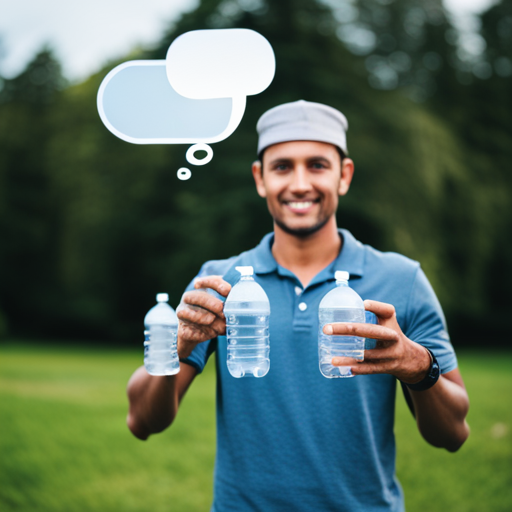Are you a frequent consumer of bottled water? While it may be a convenient and safe option for you, have you considered the environmental impact and potential health implications?
In this article, we will explore the pros and cons of bottled water to help you make an informed decision about your drinking water choices.
Firstly, it is important to understand the safety and regulations surrounding bottled water. The FDA regulates bottled water for safety, but different brands may vary in quality, taste, and filtration methods.
Additionally, excess fluoride and plastic pollution are concerns that should be taken into consideration. By understanding the regulations and potential risks associated with bottled water, you can make a more informed decision about the water source you choose to consume.
Key Takeaways
– Bottled water can be a safe and reliable source of drinking water, but different brands vary in quality and taste.
– Plastic bottles have a significant impact on the environment, and proper disposal and using reusable bottles can reduce this impact.
– Consumers should research the brand and type of bottled water they consume, look for certifications or seals of approval from reputable organizations, and check labels to understand the source and treatment.
– Bottled and sparkling water can contain concerning levels of PFAS, and consumers should be aware of this when choosing their water.
Safety and Regulations
You should know that bottled water is regulated by the FDA to ensure its safety, and different brands vary in quality and taste.
The FDA has established standards for bottled water that require it to be as safe and pure as tap water, and in some cases, even more so. However, there is still the potential for contaminants to be present in bottled water, especially if it comes from a poorly regulated source or is not properly treated.
The FDA regulations require bottled water to be tested for a variety of potential contaminants, including bacteria, pesticides, and heavy metals. However, there are still concerns about the potential for other contaminants, such as microplastics and PFAS, to be present in bottled water.
It’s important to choose a reputable brand and look for certifications or seals of approval from reputable organizations to ensure that the bottled water you’re drinking is safe and free of potential contaminants.
Environmental Impact
Consider the significant impact that plastic bottles have on the environment when choosing your drinking water source. Plastic pollution is a major concern worldwide, and plastic bottles are a significant contributor to this issue.
When plastic bottles end up in landfills or oceans, they can take hundreds of years to decompose, releasing harmful chemicals and contributing to the destruction of ecosystems. To make matters worse, only a small percentage of plastic bottles are actually recycled, further exacerbating the problem.
However, there are sustainability efforts being made by some bottled water companies to mitigate their environmental impact. Some companies are using more eco-friendly packaging, such as biodegradable bottles or recycled plastic. Additionally, some companies are implementing programs to reduce plastic waste, such as encouraging customers to recycle or offering refillable water stations.
When choosing a bottled water brand, consider their commitment to sustainability and their efforts to reduce their environmental impact. By making a conscious choice in your drinking water source, you can help reduce the negative impact on the environment.
Choosing the Healthiest Option
To choose the healthiest option for your drinking water, look for mineral or spring water with optimal levels of calcium and magnesium and low levels of sodium. These minerals are essential for maintaining healthy bones and teeth, and can also help regulate blood pressure and support muscle function.
However, it’s important to be mindful of the fluoride content in your bottled water, as excessive intake can lead to health side effects. Check the label to understand the fluoride content and reach out to the company if in doubt.
In addition to mineral and spring water, it’s also important to research the brand and type for certifications and seals of approval from reputable organizations. These certifications ensure that the water has undergone rigorous testing and meets certain quality standards.
By minimizing fluoride intake and researching water sources, you can choose the healthiest option for your bottled water and support your overall health and wellbeing. Remember, staying hydrated is important, but it’s equally important to make informed decisions about the water you drink.
Conclusion
So, now that you’ve weighed the pros and cons of bottled water, what’s the verdict? Ultimately, the decision is up to you and your personal priorities.
If safety and convenience are your top concerns, bottled water may be a good option for you. Just be sure to choose a reputable brand that prioritizes filtration and quality control.
However, if you’re concerned about the environmental impact of bottled water or the potential health risks associated with excess fluoride, plastic pollution, or PFAS, there are plenty of alternatives to explore. Consider investing in a water filtration system for your home, using a reusable water bottle, or opting for tap water when it’s available.
Whatever you choose, make sure to stay informed and make conscious decisions about your drinking water.




